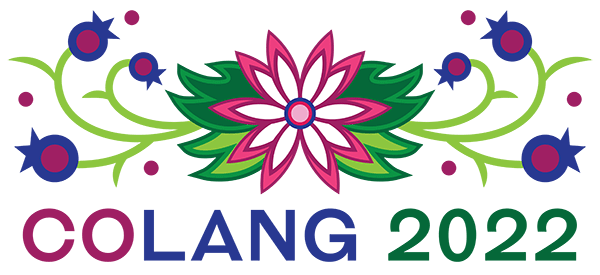Event Title
20. Language Work Outside Your Own Community (D, E)
Location
Payne Family Native American Center, Room 103
Start Date
13-6-2022 4:00 PM
End Date
24-6-2022 5:30 PM
Description
In the face of widespread language endangerment, there has been a major expansion of language documentation, linguistic description, and language revitalization. Such projects usually require what has historically been called fieldwork, the situation in which a researcher (usually an outsider) enters a community (sometimes for extended periods of time) for the purposes of studying the language and/or culture of the people in that community. Modern language documentation and revitalization projects that involve an outside researcher usually require deep engagement with community collaborators, as well as recognition of Indigenous Research Methodologies. Outside researchers generally prepare for “fieldwork” through field methods courses, but “[w]hile we generally do a very thorough job of teaching how to elicit and analyze data, we often forget to tell them that there is a personal and practical side to fieldwork that can very well derail their research if they are not prepared for it.” (Macauley, 2004:194). Speech communities rarely have any preparation for such projects. The overall goal of this workshop is, therefore, to familiarize both linguistic researchers and community members with the personal and practical dimensions of cross-cultural fieldwork. We want to stimulate conversations about how language work outside of our own communities can meet both researcher and community needs and goals, recognize and respect Indigenous Research Methodologies, and help the researcher learn about cultural institutions, protocols, values, and needs. This orientation will guide us in discussing how researchers and speech communities establish contact, set up and maintain productive and satisfying work relations, and balance research and social goals. This workshop will also cover topics on how to negotiate cross-cultural boundaries that deal with more personal matters that sometimes become challenges for the outside researcher (self-care). In this way, all involved can have the most rewarding experience possible.
Questions you will consider (and maybe answer for yourself) in this workshop:
From the outsider researcher’s perspective:
- How do I prepare myself to conduct work on a language outside of my own community?
- Are there general principles that guide successful language work outside of my own community?
- What ethical principles do I need to know about language work?
- What ethical principles do I need to know about the community?
- What principles of cross-cultural communication do I need to be aware of?
- How much can I be a linguist and only a linguist in the community?
- How do I balance scientific work and community work?
- How do I involve community members and Indigenous Research Methodologies in my project? What kinds of resources do I need?
- What is the role of my primary relations in the community?
- Whom do I contact first?
- What are the risks associated with me being an outsider, for me and for the community?
- How do I negotiate cultural and ideological differences?
- Should I keep any of my personal information (gender, sexual orientation, religious, etc.) confidential?
- How do I take care of myself, both physically and emotionally?
From the community’s perspective:
- What is the community’s role in the proposed language work?
- Does the researcher’s presence/stay need to be addressed in a public meeting?
- What do we need to know about the researcher?
- What will be the outcomes of the language work? How will they benefit the community/participants?
Category(ies)
Documentation; Ethics
Day 1 Q&A
day-2-handout.pdf (89 kB)
Day 2 Handout
models-of-language-work.pdf (356 kB)
Models of Language Work
physical-and-emotional-health-in-a-foreign-culture.pptx (45 kB)
Physical and Emotional Health While Doing Language Work in Foreign Cultures
colang2014-generic-medical-advice.pdf (178 kB)
Advice for Health Care (CoLang 2014)
colang2014-slides.pdf (937 kB)
CoLang 2014 Slides
Recommended Citation
Gildea, Spike and Pérez González, Jaime, "20. Language Work Outside Your Own Community (D, E)" (2023). CoLang 2022 Workshops. 12.
https://scholarworks.umt.edu/colang2022_workshops/12
